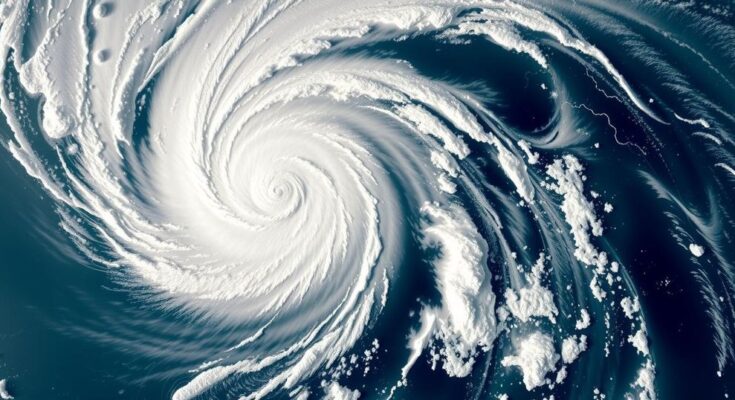Cyclone Chido has rocked Mayotte, carrying winds over 220 km/h and causing extensive property damage without reports of casualties. With emergency responders deployed, the cyclone’s path could affect millions in Mozambique, Malawi, and Zimbabwe. Preparations are underway to manage severe flooding and health risks, emphasizing the need for effective humanitarian response to increasing climate-related disasters.
Cyclone Chido has severely impacted Mayotte, a French territory in the Indian Ocean, causing substantial devastation as it approaches eastern Africa. With winds exceeding 220 kilometers per hour, the cyclone has resulted in extensive property damage, including the destruction of metal roofs and the uprooting of trees. The Prefect of Mayotte, Francois-Xavier Bieuville, labeled this cyclone as the most violent since 1934, indicating a crisis situation where many residents have lost their homes. Although there have been no immediate reports of fatalities, Mayotte remains under a red alert status, urging residents to take refuge in sturdy shelters while only allowing emergency responders on the streets.
Interior Minister Bruno Retailleau has acknowledged the extensive damage and emphasized the mobilization of state and local emergency services, with over 250 personnel deployed from France and Reunion to assist in recovery efforts. Reports indicate widespread power outages affecting thousands of homes, along with the loss of smaller structures. Nearby, the island nation of Comoros is also facing severe weather conditions, prompting authorities to issue high alerts and maintain closures of key facilities.
As Cyclone Chido continues its track towards Mozambique, forecasts indicate that up to 2.5 million individuals could be affected in the Cabo Delgado and Nampula provinces. Furthermore, inland nations such as Malawi and Zimbabwe are preparing for the possibility of severe flooding, with authorities recommending evacuations and relocations to higher ground where necessary. The cyclone season, occurring from December to March, has seen a proliferation of severe storms in recent years, highlighting significant risks to vulnerable communities, including potential outbreaks of waterborne diseases following flood events.
Cyclone seasons in the southern Indian Ocean, particularly from December to March, have become increasingly tumultuous, with storms like Cyclone Idai and Cyclone Freddy previously causing substantial loss of life in the region. The recent incident of Cyclone Chido, the most violent cyclone to hit Mayotte since 1934, serves as a stark reminder of the escalating severe weather patterns likely exacerbated by climate change. This phenomenon impacts poorer nations that historically contribute little to climate change yet disproportionately face its dire consequences, necessitating international humanitarian response and support.
In conclusion, Cyclone Chido has caused significant damage in Mayotte, with local officials urging caution and prioritizing recovery efforts. As the storm progresses toward Mozambique and potentially other countries in the region, there is an urgent need for preparedness to mitigate the adverse effects on the population. The ongoing challenges highlight the importance of addressing the global climate crisis, which is seemingly resulting in increasingly severe weather events in southern Africa.
Original Source: www.voanews.com




